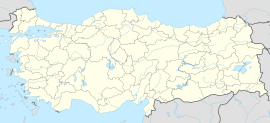Yeşilova incident
| Yeşilova incident | |||||||
|---|---|---|---|---|---|---|---|
| |||||||
| Belligerents | |||||||
|
|
| ||||||
| Commanders and leaders | |||||||
|
|
| ||||||
| Units involved | |||||||
|
|
| ||||||
| Strength | |||||||
| 30 marines | Several hundreds[1] | ||||||
| Casualties and losses | |||||||
"ARMADURA Z29 HELMET ARMOR Z29" by OSCAR CREATIVO | |||||||
The Yeşilova incident was a reported armed standoff that took place at a refugee camp in Yeşilova, a small Turkish town near the border between Iraq and Turkey, between British Royal Marines and the Turkish Armed Forces. Local Turkish soldiers have been accused by reporter Robert Fisk of stealing essential goods and preventing medical care from deprived refugees in dire conditions, with a cholera outbreak ongoing. Other reporters such as Hugh Pope deny this version of the events.
Background
[edit]In March 1991, with the end of hostilities between Coalition forces and the Iraqi military, Iraqi President Saddam Hussein sought to quash the rising Shiite and Kurdish insurgents who were rebelling against his regime. Saddam managed to put down the rebellions with little effort but continued to persecute the Kurds in northern Iraq. Thousands of Kurdish and Assyrian civilians were displaced, most of them finding shelter in refugee camps in Turkey. Though coalition forces ultimately chose not to intervene against the crackdown, they did launch a massive humanitarian relief effort to at least help alleviate the plight of the refugees.
The incident
[edit]According to British journalist Robert Fisk, the only reporter present, in April 1991, a British Marines unit consisting of about thirty men was tasked with distributing relief supplies to 3,000 Kurds and Assyrians in Yeşilova under the watch of the Turkish military, but they found themselves in direct confrontation with the Turks. The Turkish soldiers, instead of cooperating with the British Marines in relief distribution, were charged with stealing blankets, bed linen, flour and food, including sixty boxes of water, intended for the refugees, forcing the Marines to intervene.[2] The British Marines asked to transport the refugees out of the country, a request that was denied by the local Turkish commander. The Marines were thus forced to pile the supplies back into their helicopters to prevent further pillaging but also faced a possible firefight against the Turkish forces. On April 29, a detachment of diplomatic officials and CIA agents attached to the United States Embassy in Ankara arrived in Yeşilova to help defuse the situation. They found that various diseases, including cases of acute diarrhea and cholera, had broken out among the civilians in the camp and that the refugees had been deprived of medical services by the Turkish military.[3]
Fisk filed an article for the newspaper The Independent on April 30 from Diyarbakır, describing the confrontation between the Royal Marines and the Turkish soldiers. Fisk's report incensed Turkish authorities, who detained him in Diyarbakır.[4] Turkey's Foreign Ministry and the army's Chief of Staff, General Doğan Güreş, denounced Fisk's article, claiming it was "planned, programmed propaganda."[5] He was interrogated but eventually released and expelled from Turkey. Fisk speculated that charges were being prepared by the governor of Diyarbakır for "defaming" the Turkish military and later described the interrogation session as "pathetic and frightening."[6]
Fisk's fellow journalist at the Independent, Hugh Pope stated that his "cavalier treatment of facts seems to be true" in the case, pointing out numerous inaccuracies in Fisk's account. [7]
John Kifner of the New York Times also covered the story quoting a Royal Marines spokesman, Sgt. N. B. Durant, who described the incident between British and Turkish soldiers as a "Mexican standoff."[8]
Reactions
[edit]The European Commission and numerous journalists protested and demanded an explanation from the Turkish government.[5]
Notes
[edit]- ^ Dining with al-Qaeda: Three Decades Exploring the Many Worlds of the Middle Eas. Hugh Pope. Macmillan. 2010. P.24
- ^ Fisk, Robert. The Great War for Civilisation: The Conquest of the Middle East. New York: Alfred A. Knopf, 2005, p. 676. ISBN 1-4000-4151-1.
- ^ Fisk. The Great War for Civilisation, p. 677.
- ^ "Turks Arrest Journalist, Expel 30 British Marines From Camp Refugees: The two incidents spotlight growing friction with the allies that are leading the relief effort. Archived 2012-11-07 at the Wayback Machine" Los Angeles Times. May 3, 1991. Retrieved September 5, 2011.
- ^ a b Fisk. The Great War for Civilisation, p. 680.
- ^ Fisk, Robert. "Interrogation by Turks 'pathetic, frightening'." The Toronto Star. May 5, 1991. Throughout his interrogation, Fisk noted that the policemen held wooden cudgels and repeatedly stated that his report was false: "They desperately wanted it to be a lie, my report about the Turkish soldiers who looted food and bottles of water and blankets from the Kurdish refugees at Yasilova...[Superintendent of the police station Hassan] Luru wanted me to say that it had not happened, that I had defamed the Turkish army."
- ^ ""I don't read Hugh Pope" – Robert Fisk". Hugh Pope. 2011-11-20. Retrieved 2020-03-07.
- ^ "AFTER THE WAR; Strains Appear Between Turks And Aid Troops." New York Times, May 4 1991.
- 1991 in Turkey
- 1991 Iraqi uprisings
- Conflicts in 1991
- Aftermath of the Gulf War
- History of the Kurdish people
- Turkey–United Kingdom relations
- April 1991 events in Turkey
- 20th-century military history of the United Kingdom
- Armed standoffs in Asia
- 1991 in Iraqi Kurdistan
- History of Şırnak Province
- Diplomatic incidents
- History of the Royal Marines

